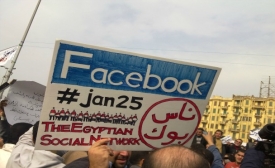social media
But when that fails, the Broadcasting Broad of Governors, which oversees the government-owned media organizations that send pro-American messages to foreign audiences, has begun using social media to go around online restrictions in repressive countries. Perhaps the most important? Facebook.
In a sense, two different revolutions are ongoing in Egypt. One is a struggle for power, which led to Mubarak's resignation. The other, broader revolution is a transfer of power that puts media in the hands of the people and allows individuals with nothing more than a cell phone to publish, broadcast and tweet to the world in real time.
India will be be “talking real issues” with Pakistan when the two sides resume their peace dialogue, stalled since the 2008 Mumbai attacks, in the coming weeks and “talking to neighbours makes good sense” said foreign secretary Nirupama Rao, making her debut on the social networking site Twitter on Friday.

The USC Center on Public Diplomacy and the USC Annenberg Center on Communication Leadership & Policy were pleased to co-host a round-table discussion about the media and Middle East Turmoil. News and social media played a crucial role as revolution sweeps through much of the Arab world.
The U.S. ambassador to the United Nations is hosting a global town hall at Twitter headquarters to talk foreign policy with users of the online messaging service. Ambassador Susan Rice will be taking questions from around the world Thursday morning via Twitter and from employees at the company's San Francisco office.
The State Department -- already pretty good at the social media thing -- is now using Twitter to transmit its thoughts to the Arab world in ... Arabic. Foggy Bottom is using @USAbilAraby, which in English means "USA in Arabic."
With Egypt in the midst of a revolution and Tunisia coming to terms with life after dictatorship, Syria’s government has surprised the region by taking a potentially significant step to soften its grip on power: it has removed many of its internet restrictions.
Tech-savvy young Egyptians wanted to spread the word about widespread discontent in their country, but they didn't expect the massive uprising that would paralyze the country and draw the world's attention. The Mubarak regime recognized the role the Internet was playing in stirring resentment of the government and shut down access in the country.







